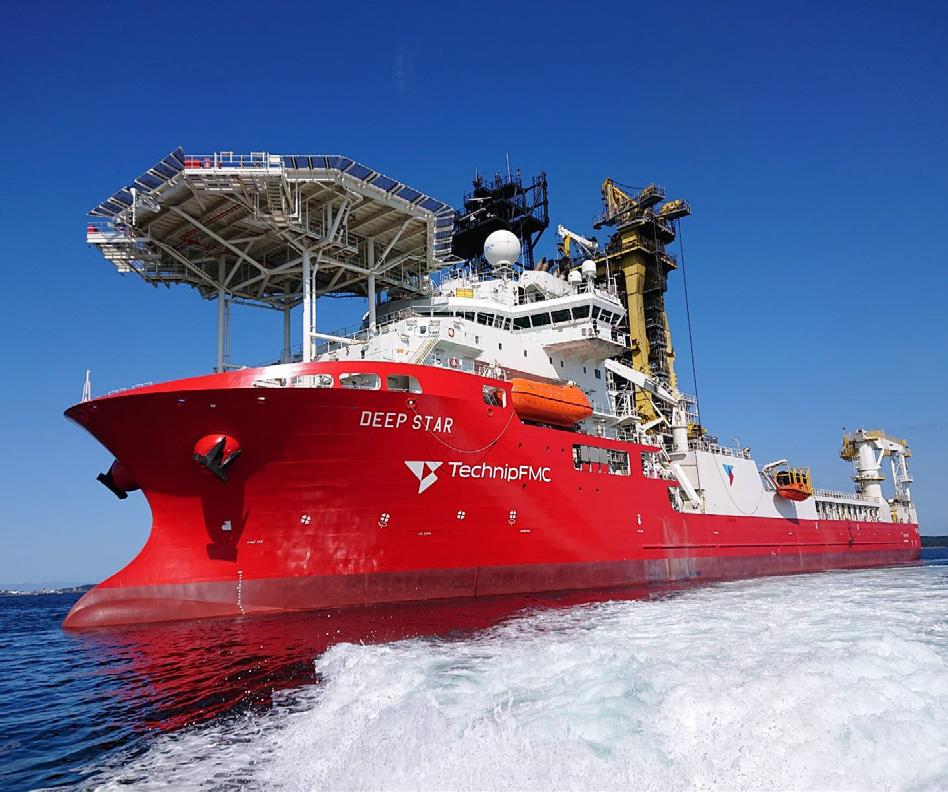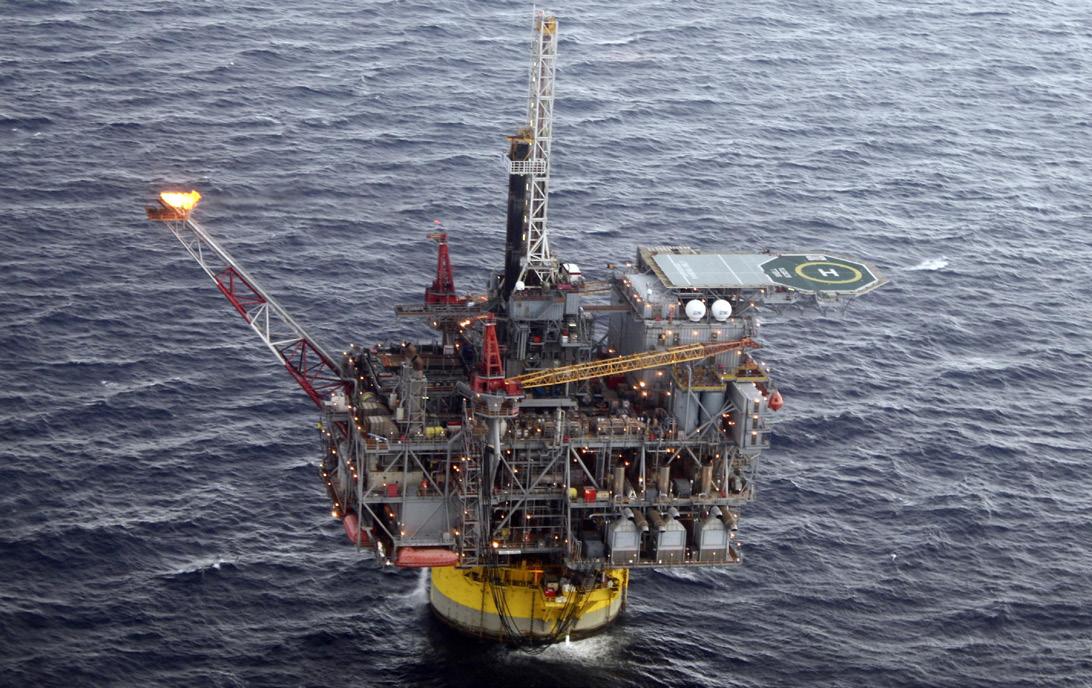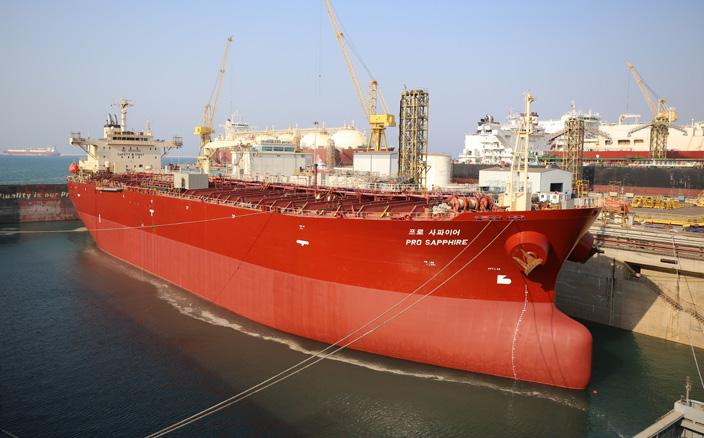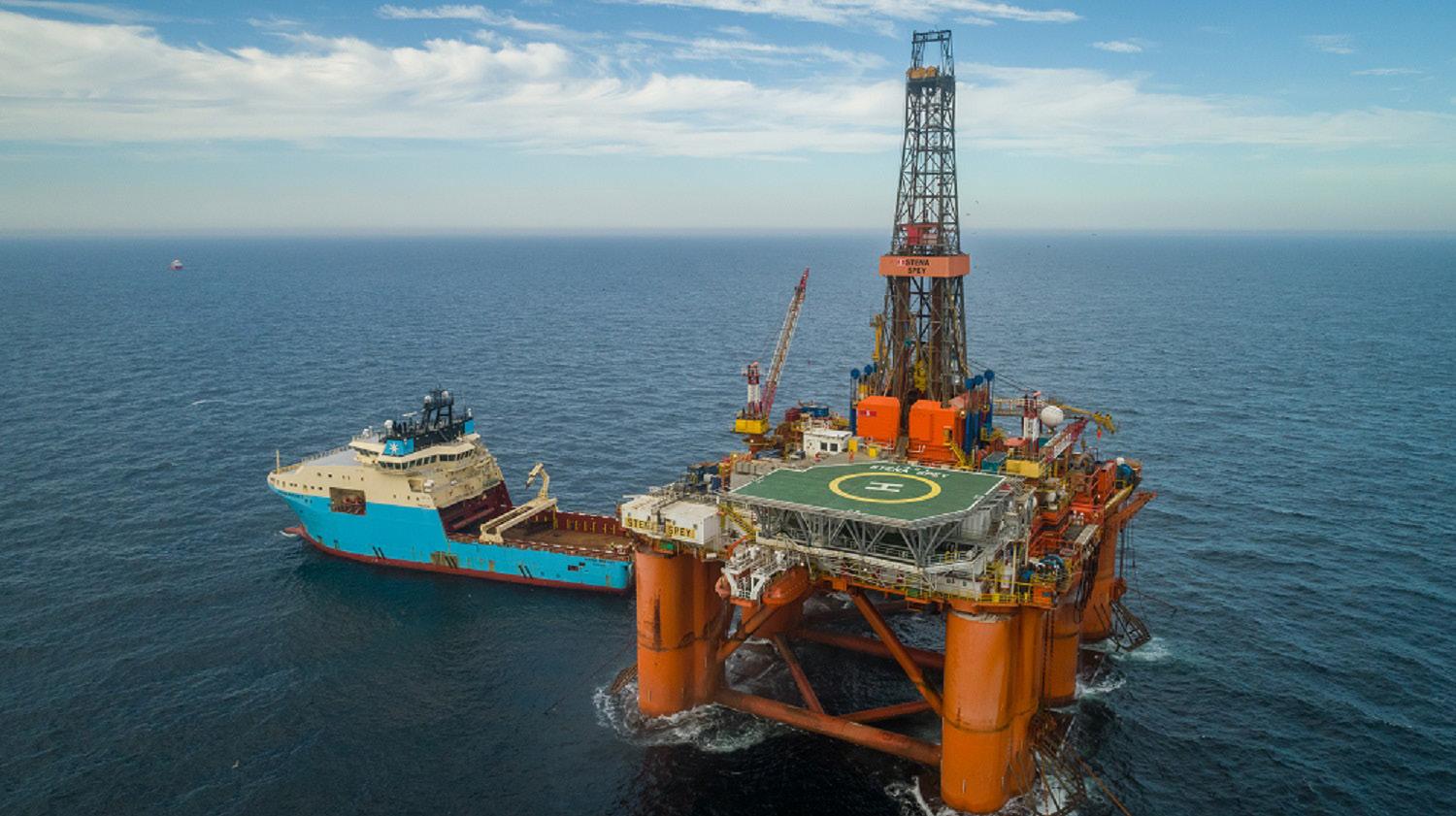
16 minute read
Offshore - Floating Units
By Paul Bartlett
Energy security concerns likely to boost FPSO sector
Advertisement
Short-term fluctuations in energy prices have little impact on capital investment in the oil and gas market, but fundamental shifts in energy patterns are a key input in the decision-making process. The world has experienced two such shifts recently - first, the economic havoc caused by the pandemic which, in many locations, is still very much in evidence, and second, Russia’s invasion of Ukraine that has sent oil and gas prices rocketing amid mounting concern over energy security, especially in Europe.
As fears grow over whether power cuts will become necessary during Europe’s winter months, individual countries are doing all they can to identify any spare extra supplies of energy. The continent’s gas reserves will be well below its usual October target for various reasons. Germany has called a halt on plans to close more than 20% of its coal-fired power stations this year, while countries including Austria, France, Netherlands and UK have said they will delay coal plant closures or reopen mothballed ones.
Meanwhile, nuclear facilities in France are undergoing annual maintenance and running at less than 50% of capacity. The country’s spot power prices averaged €197 in May, compared with just €15 at the same time last year. Meanwhile Brent crude prices dipped below US$100 very briefly during the first week of July but rose again within days to settle around $103.
Energy companies’ decisions on floating production systems come after many months of detailed analysis. But even before the Russian invasion, there were clear signs that the floating production sector was set to make further improvements on its 2021 bounce-back. According to figures from Oslo-based analyst, Rystad Energy, there were some 11 FPSO contract awards in 2019, but only three in 2020.
Last year, from an initial estimate of seven new contracts, the total ended up at 10. Seven of these deals involved ultra-deepwater FPSOs for Brazil, with one each for Australia, China and Canada. A similar number of contract awards is expected this year too, according to Rystad. Brazil is likely to account for three more contracts, with other deals in Angola (1), Australia (1), China (1), Guyana (1), Malaysia (1), and UK (2).
ExxonMobil is now producing oil in Guyana, using the FPSO Liza Destiny. The unit arrived on location last October. Separately, the oil major awarded an FPSO front-end engineering design (FEED) contract to SBM Offshore for the deepwater Yellowtail development in Guyana. It will be a large unit, likely to have oil-processing capacity of 250,000 bbls/day, gas processing of 450m ft3/d and storage of 2m bbls. Rystad estimates that when the Yellowtail and Prosperity projects start operating in 2024/5, the US major will have a total processing capacity of more than 800,000 bbls/day in Guyana.
Meanwhile, in Norway, state energy company Equinor has commissioned a FEED contract from Aker Solutions relating to the deployment of a circular FPSO on the Wisting field in the Norwegian sector of the Barents Sea. The arrangement includes an option for the engineering, procurement, construction and installation of the FPSO topside, potentially worth between $960m and $1.45bn.
Commenting early this year, before Russian hostilities, one of Rystad’s senior analysts, Zhenying Wu, commented on the market. “With around 30 FPSO units under construction or queued up for construction, and another 10 expected to be awarded over the next 12 months, the market is set to build on its recent success,” she said. “However, as witnessed in many other facets of the global economy in recent months, supply chain concerns linger and will test the market’s ability to take in new contracts without uncontrollable cost overruns and delays.”
Precise fleet numbers are difficult to verify, but analysis by Intelatus Global Partners suggests that there are now more than 150 FPSOs in operation. There are about 30 more units on order and in excess of a hundred more that are planned. It is not yet clear how the latest world energy crisis will impact the sector, but experts suggest that it is likely to strengthen demand for floating units of various types, including FPSOs, in the months ahead.
Late in March, energy services company Petrofac announced that its Perth-based team had won a contract from the Australian Government to complete Phase 1 of the decommissioning of the FPSO Northern Endeavour. The 274 m unit is located in the Timor Sea about 550 kms north-west of Darwin between the Laminaria and Corallina oil fields. It began production in 1999 and achieved a peak output of 170,000 bbls/ day. However, it has not produced oil since it was shut down in 2019.
It was at that time that owner of the oil fields, Northern Oil & Gas Australia, went into liquidation, leaving the Government to handle both the FPSO and the oil reserves. However, a decision to impose a levy on oil and gas firms to fund the decommissioning process of the oil fields and the FPSO sparked opposition from offshore firms including oil majors Chevron Corp, ExxonMobil Corp and Shell, and Australian oil firm, Woodside. They claimed that it was unfair that they should pay the decommissioning costs for a facility in which they had no involvement.
However, it is understood that a temporary levy has been imposed on oil and gas companies. According to reports, the Government has said that this is to ensure that taxpayers are not left to pick up the bill for decommissioning and remediation at the oil fields. The levy is being imposed for the years between 2021 and 2029. According to the
Decommissioning deal
The Northern Endeavour


Spherical (Moss-type) LNG tankers
Government’s website, this period was chosen to ensure that the levy remains in place for the duration of the decommissioning of the oil fields and related infrastructure.
Now, the Government has appointed offshore engineering firm, Wood, to work on its behalf to oversee the first decommissioning phase. Wood will work with Australia’s Department of Industry, Science, Energy & Resources to ensure the safe, efficient, and responsible first phase of the decommissioning operation. In a statement, Wood noted that this is the first time that the government had selected a partner for this type of decommissioning contract and could pave the way for similar deals in the future.
Re-use of old LNG tanks for FLNGs
An innovative concept for a FLNG vessel utilising storage tanks from older LNG carriers has been granted an AIP by ABS. The design, jointly developed by Kawasaki Kisen Kaisha, and JGC Corporation (JGC), supported by Japan’s Ministry of Land, Infrastructure, Transport and Tourism, involves transferring and reusing LNG storage tanks from spherical tank (Moss tank) LNG carriers in the hulls of new FLNG facilities.
By re-using existing LNG vessels’ Type B storage tanks, the potential number of shipyards globally able to build FLNG units is increased, which supports the forecasted demand for a wider and quicker adoption of FLNG technology.
“In many areas of the world, FLNG represents a potential solution to the challenge of meeting increasing demand for natural gas without the need for an export pipeline to shore and the associated infrastructure. ABS is committed to supporting development of FLNG globally while retaining a laser focus on safety,” said Tor Ivar Guttulsrod, ABS Director, FLNG and FSRU. “This innovative FLNG leverages K LINE’s expertise in LNG tanker business and contributes to re-use of existing assets to support the world’s environment. K LINE will continue to make relentless efforts and generate new values to meet the diversifying needs of our customers,” said Satoshi Kanamori, Executive Officer of K LINE.
“This is based on our technical capabilities accumulated in FLNG EPC projects. This results in the enhancement of the customer’s FLNG business since it is potentially an optimised CAPEX solution. JGC will continue to develop FLNG technologies for open seas and nearshore,” said Hiroyuki Ishizaki, Executive Officer of JGC Corporation.
ABS is the preferred classification organisation for the offshore and energy industry and has been integral to the evolution of gas development with a long history of working with floating gas concepts including the first purpose-built LPG floating storage and offloading unit, delivered in 1997, and the first LPG FPSO in 2005.

The FPSO Atlanta
Yinson contract for DDW
Dubai’s Drydocks World (DDW) has signed a contract with Malaysia’s Yinson Production to upgrade, refurbish, and convert the FPSO Atlanta. The contract with Yinson Production, which designs, constructs, and operates industry-leading production assets for the offshore oil and gas industry – covers conversion and life extension services, as well as refurbishment for the FPSO Atlanta. Earlier this year, Enauta purchased the FPSO OSX-2 for the Definitive System (DS) of the Atlanta field offshore Brazil.
The upgraded FPSO will be delivered in the third quarter of 2023 to Brazilian independent oil and gas company Enauta at the offshore Atlanta Field in the Santos Basin. FPSOs are vital to offshore oil operations, receiving crude oil and other liquids from subsea reservoirs and separating it into natural gas and oil with processing facilities on-board. The FPSO project with DDW will be fully operational by 2024 and support Yinson Production’s goal of producing up to 50,000 bbls of oil/day from the field.
The technical scope of work for the 18-month project at the DDW shipyard includes production engineering, procurement of bulk material, construction as well as support for onshore commissioning. Additionally, the redeployment scope of the project includes steel renewal, piping refurbishment, tank coating, refurbishment of equipment, and the upgrade of an FPSO for operation at the Atlanta field in the Santos basin, Brazil. This includes life extension and installation of new equipment in order to utilise 100% of produced gas and minimising GHG emissions.
ABS to class FPSO Atlanta
The FPSO Atlanta, contracted by Enauta to Yinson for conversion to service the Atlanta Field offshore Brazil, will be operated under ABS Class. The Atlanta, which is being converted in Dubai’s Drydocks World (DDW), including structural upgrades, refurbishment and enhancement of equipment, will have a production capacity of 50,000 bbls of oil/day, 12.4 MMscfd gas and a storage capacity of 1,800,000 bbls.
Operated by Enauta, the Atlanta Field is located in the Santos Basin, block BS-4, at 1,500 m water depth with estimated reserves of 106 MMbbl. Formerly known as OSX-2, the vessel was converted in 2013 under ABS Class to operate in the Waimea field in Brazil but never commenced operations.
“This is a significant, complex asset capable of operating in ultra-deep
The potential of the latest digital technologies to advance safety performance of the global FPSO fleet is explored in the latest offshore industry guidance from ABS
A BW Offshore FPSO

water offshore Brazil today. Through our focus on safety and innovation, we are able to continue demonstrating our leadership in Brazil, where more than 60% of all FPSOs in service are ABS classed. This is not only down to our long-standing leadership in offshore classification but our deep knowledge of the Brazilian regulatory environment and the experience to support clients in achieving regulatory compliance,” said Matt Tremblay, ABS Vice President, Global Offshore.
ABS has developed detailed practical guidance to assist offshore operators in navigating Brazil’s unique regulatory environment. ‘Practical Considerations for Regulatory Compliance in Brazil’ is designed to help floating production installations operating in Brazilian Jurisdictional Waters comply with a series of requirements that are specific and set forth by multiple local agencies.
Meanwhile, the potential of the latest digital technologies to advance safety performance of the global FPSO fleet is explored in the latest offshore industry guidance from ABS. The ABS Whitepaper Enhancing Safety on FPSOs - Leveraging Digital Technologies considers how technologies such as remote inspection and digital twins are giving the industry an opportunity to rethink the methods to conduct asset inspections and collect and evaluate condition data. The whitepaper explores the latest Artificial Intelligence tools used to aid in corrosion detection and measurement and the potential of an accurate digital condition model, or ‘digital twin’ to support modern risk-based inspection techniques.
“The FPSO fleet is in the midst of a generational shift in the technology available to support offshore operations. For 50 years, maintenance management and condition evaluation have been a labour intensive, analogue exercise. As a safety focused organisation operating at the forefront of these technologies, ABS is able to share the insight we have learned with the industry to support the adoption of new tools and systems that improve both safety and performance,” said Matt Tremblay, ABS Vice President, Global Offshore.

Shell contract for BW Offshore
Norway’s BW Offshore has announced the award of a limited notice to proceed (LNTP) by Shell Brasil Petróleo and its partners for early-stage engineering and supplier reservations for the supply of an FPSO for the Gato do Mato oil and gas field offshore Brazil.
The LNTP is valued up to US$50m. Upon completion of the LNTP, Shell and its partners target to award a lease and operate contract to a consortium comprising BW Offshore and Saipem, which will be jointly responsible for the engineering, procurement, construction, and installation (EPCI) of the FPSO with expected delivery in 2026. The award is subject to the parties finalising the commercial and pricing terms of the contract in view of the current inflationary supply chain market and a final investment decision to proceed by Shell and its partners. The FPSO lease and operate contract will have a firm period of 18 years with seven years of options.
Meanwhile, BW Offshore has closed the transaction for the sale of the FPSO BW Joko Tole to PT Bahari Inti Tanker and PT Cahaya Haluan Pasifik, both of which are Indonesian companies, in consortium with PT Buana Lintas Lautan Tbk, a company publicly listed in Indonesia.
BW Offshore has also signed an agreement for the sale of the FPSO Polvo to BW Energy for a total consideration of US$50 m. The sale will be completed no later than July 24th, 2023. BW Energy has the option to complete the transaction before that date.
If the transaction is completed early, BW Energy will pay US$30m upon the vessel transfer date, with the remaining US$20m provided as a seller’s credit by BW Offshore until settlement on July 24th, 2023, at the latest. An independent third-party valuation of the FPSO concluded that the sales price is within a fair market value range.
FPSO Polvo vessel recently ended its charter on the Polvo field in Brazil and is currently in lay-up in Dubai. BW Energy plans to redeploy the FPSO on the Maromba field offshore Brazil. The decision to divest the FPSO, instead of entering a traditional lease and operate contract with BW Energy, is due to regulatory challenges under Brazilian related- and associated-party legislation.
EPC agreement for KM
Norway’s Kongsberg Maritime (KM) has announced that it has signed an Engineering, Procurement and Construction (EPC) agreement with the global offshore production contractor Yinson for the supply of an integrated suite of electrical and control equipment for a FPSO currently under conversion. The contract scope covers KM’s E-house, electrical,
control, safeguarding and telecommunication equipment solutions, and includes service support on-board the Maria Quitéria FPSO owned by Yinson.
The conversion project is being carried out in China’s Cosco Shangxing shipyard, Shanghai and will be chartered to Brazil’s Petrobras. She is the former FPSO Integrado Parque das Baleias. She was originally the 309,020 dwt, 2003-built VLCC Hawk, owned by Greece’s Neda Maritime. She was built in South Korea by Samsung Heavy Industries and was delivered in 2003 as the Front Hawk.
FPSO Maria Quitéria is on schedule to commence work in 2024 at the Jubarte field, part of Parque de Baleias area in the North Campos Basin, Espirito Santo State in the waters off Brazil, for field operator Petrobras. The vessel is Yinson’s second project award with Petrobras and its third project award in Brazil, in line with the group’s plans to expand its presence in this high-growth country.
KM will utilise its experience as an EIT (Engineering and Information Technology) EPC contractor working alongside Yinson to enable both organisations to leverage their dedicated and professional people to work together effectively as one team.

The Maria Quitéria FPSO (ex Hawk) owned by Yinson
Anchoring system contract for Seasystems
Scana-owned Seasystems has signed a contract for the delivery of yet another anchoring system to an FPSO project in Brazil. This is a substantial contract for Scana, with a value of more than NOK50m. The delivery consists of mooring equipment such as dual axis chain stoppers, chain handling systems and winches. The FPSO will be rebuilt. Integration of the mooring system will be conducted at Drydocks World, Dubai. For Seasystems, the project starts at once and will be delivered in the second quarter of 2023.
“Our mooring solutions are in demand. This is shown both in the strong order intake we have experienced so far this year and in the many inquiries we receive for new deliveries,” Styrk Bekkenes, CEO of Scana, says.
Mooring systems is Seasystems’ main focus area, and over the last 10 years the company has delivered more than 10 major systems to customers within the traditional oil and gas market, as well as growing markets like the LNG industry, aquaculture and floating offshore wind.
“Seasystems has worked systematically to develop hardy and costeffective mooring solutions, and we now see good results from this work,” Torkjell Lisland, MD at Seasystems, states.

Styrk Bekkenes CEO Scana
IMO puts forward FSO Safer solution
IMO Secretary-General urges States to support UN co-ordinated plan to transfer oil from degrading floating storage unit off Yemen. IMO SecretaryGeneral Kitack Lim has urged further financial support for an UN-coordinated operational plan to address the threat of a major oil spill from the FSO Safer, moored off Yemen, after a pledging event in The Hague saw donors pledging US$33m in new funding.
IMO has been supporting contingency planning efforts in the region to prepare for a possible spill from FSO Safer and to limit the impacts should one occur. An oil spill from FSO Safer would be a humanitarian and environmental disaster, with huge economic impacts for the shipping and maritime industry throughout the region. The plan to mitigate the risk by transferring the oil to a safe temporary vessel needs financial resources, Mr. Lim said.
There is now $40m available for the operation, which includes previously committed funds. The decaying floating storage and offloading unit is moored off the coast of Yemen and holds around a million barrels of oil. It could break apart or explode at any time.
The pledging event, hosted by the Government of the Netherlands and the United Nations, marked the start in the effort to raise the US$144m that the full plan requires, including US$80m for the emergency operation to transfer the oil to a safe temporary vessel. Also critical to the plan’s success is the installation of a long-term replacement capacity. SORJ

The FPSO Safer
ai16558977749_SORJ_JUN2022.pdf 1 22/06/2022 12:36:16













